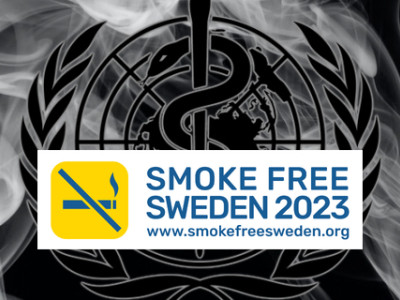The ERS says it is dedicated to sharing scientific knowledge, fighting lung disease and promoting lung health, but the position paper on tobacco harm reduction demonstrates it is very selective in what scientific knowledge it recognises.
It states: “The ERS TCC believe that current strategies which support the use of alternative nicotine delivery products for smoking cessation are not effective as they are based upon incorrect assumptions and undocumented claims about the safety and effectiveness of alternative nicotine delivery products for smoking cessation.”
TCC Chair Charlotta Pisinger has written extensively about vaping: “When I first heard about the e-cigarette, I was excited. Was this the miraculous alternative to conventional cigarettes that could prevent millions of peoples’ suffering? Today, big tobacco companies have bought up the market, sales are exploding, and I and many other health professionals are worried.”
The problem with this statement is that she made it in 2014 – Big Tobacco has yet to ‘buy up the market’ and certainly hadn’t five years ago. Back then, she also claimed “ECs are marketed as safe products”, that vaping caused asthma and that eliquids contained urine!
It appears that she is either reluctant to pay heed to the positive studies since then or she can’t admit that she was desperately wrong about everything at the outset.
The ERS says its statement “brings together scientifically-backed arguments for why a tobacco harm reduction strategy should not be used as a population-based strategy in tobacco control, including that harm reduction arguments are:
- Based on incorrect claims that smokers cannot or will not quit smoking
- Reliant upon undocumented assumptions that alternative nicotine delivery products are highly effective as a smoking cessation aid
- Built on incorrect assumptions that smokers will replace conventional cigarettes with alternative nicotine delivery products
- Ignorant to the lack of evidence to show that alternative nicotine delivery products are safe for human health”
Launching the paper, Pisinger said: “Tobacco harm reduction strategies are based on incorrect assumptions that smokers cannot or will not quit smoking, but in reality, the majority of smokers want to quit and they dislike being nicotine dependent. Most of the new products, including heated tobacco and e-cigarettes, are devices of nicotine inhalation, and therefore do not help smokers to beat their addiction to nicotine.”
“There is also a lack of evidence to support the claims that e-cigarettes are more effective than established smoking cessation medications or nicotine replacement therapies, but the few independent studies that have been published indicate that e-cig and heated tobacco device use undermines quit attempts outside of a clinical setting, and show that most people use alternative nicotine delivery products alongside conventional cigarettes, rather than as a replacement.”
The TCC states: “Tobacco harm reduction strategies that support the use of alternative nicotine delivery products for smoking cessation are not effective and are based upon incorrect assumptions and undocumented claims.”
As a consequence, the TCC concludes: “We cannot recommend tobacco harm reduction as a population-based strategy”.
Chris Howard, General Counsel & CCO of E-Alternative Solutions, reacted by saying: “I love this one: ‘Evidence-based tobacco dependence treatments already exist and are safe and cost-effective, and we must utilise this’. So, a 6% success rate (& 94% failure rate) with NRT products is a better option than ecigs? You guys at ERS have no credibility whatsoever.”
Harm-reduction advocate Jukka Kelovuori commented: “Even if many smokers say they want to quit the reality is many of them don't even try and most of those who do try with ‘approved’ methods, fail. Your position is leaving all those smokers behind and I can't see this being anything other than blinkered and harmful ideology.”
Foundation for a Smoke-Free World’s Charles Gardner pointed out that nobody claims vaping is “safe” and that waiting until the long-term effects are known in detail simply consigns “millions to die while you do more research”.
Resources:
- “Why public health people are more worried than excited over e-cigarettes” by Charlotta Pisinger – [link]
- The ERS – [link]
- ERS Position Paper on Tobacco Harm Reduction – [link]
Dave Cross
Journalist at POTVDave is a freelance writer; with articles on music, motorbikes, football, pop-science, vaping and tobacco harm reduction in Sounds, Melody Maker, UBG, AWoL, Bike, When Saturday Comes, Vape News Magazine, and syndicated across the Johnston Press group. He was published in an anthology of “Greatest Football Writing”, but still believes this was a mistake. Dave contributes sketches to comedy shows and used to co-host a radio sketch show. He’s worked with numerous vape companies to develop content for their websites.
Join the discussion
Harm Reduction For The Rich
The United Kingdom risks becoming a harm reduction country only for the wealthy, according to Michael Landl of the World Vapers’ Alliance
CAPHRA Highlights Tobacco Control Flaws
The Coalition of Asia Pacific Tobacco Harm Reduction Advocates highlights the flaws in tobacco control which has led to the rise of black market in Australia
A Missed Opportunity at COP10
The Smoke Free Sweden movement says that COP10 was a missed opportunity to save millions of lives
COP10: Promote Tobacco Harm Reduction
Experts with Smoke Free Sweden are emphasising the urgent need for a Tobacco Harm Reduction approach at COP10












